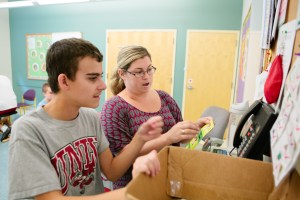According to the national awareness organization Autism Speaks, autism spectrum disorder, or ADS, affects roughly one in every 88 children in the U.S.
Although there’s no known medical cure for autism, educational and developmentally-based treatment programs can help children with this disorder conquer the challenges of daily life. Residential schools for autistic children offer 24-hour-a-day care along with educational and social learning lessons.
Therapeutic Aspects of School
Residential programs for autistic children go above and beyond what typical boarding schools offer. While academic learning is highlighted in an ASD-focused school, the students also receive intensive therapy along with their lessons. The specific therapeutic methods that a school employs vary, depending on the program’s goals and philosophy. For example, the Anderson Center for Autism in Staatsburg, New York, bases their residential program on Applied Behavior Analysis, which seeks to develop personal care, communication, social interaction, recreation, play and community integration. Other therapeutic techniques that residential schools for autistic children may use include pivotal response therapy or verbal behavior therapy.
For All Ages?
Unlike your local public school, residential autism schools often serve a much wider range of ages. Additionally, a residential ASD program may include schooling for young adults who would have aged out of a traditional school. For example, the Hughes Center in Danville, Virginia, has a residential school program for individuals ages 13 through 22 who have been diagnosed with ASD. Likewise, the Anderson Center for Autism’s program accepts children and young adults up to 21 years old.
Academic Excellence
Although focusing on the social and behavioral aspects of autism is a primary area of concern for ASD residential programs, these schools also comprise an academic component. While the children are getting therapy and learning new skills to cope with everyday situations, they are also getting a full education. For example, the Glenholme School in Devereux, Connecticut, has a full curriculum that steers to a high school diploma. This residential school, like others of its kind, offers classes at varying degree levels to accommodate the differing learning styles of the students.
Social Structure and Living Arrangements
The residential focus of an autism-centered boarding school lends itself to socialization and skill development in this area. Autistic students who have social learning needs gain from the opportunity to live with a roommate or several other children. Some schools, such as Glenholme, highlight communal living through their living arrangements. Glenholme features cottages that house 10 to 12 students. The Grove School in Madison, Connecticut, also houses students in small cottage dorms. Students at this residential school live with six to 10 other children, with two, three or four in each individual room.

